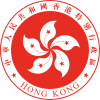Hong Kong nationalism

Hong Kong nationalism (Chinese: 香港民族主義 or 香港主義) is a system of thought that spans the folklore, culture, history, geography, society, and politics of Hong Kong.
Hong Kong nationalism is generally considered a new phenomenon, as the self-identification of the Hong Kong people has only been considered nationalism when the local discourse developed claims on self-determination, autonomy and varying degrees of separation from China.[1] Many Hong Kong nationalists is opposition to Chinese state nationalism (中國國家主義).[2]
History[edit]
Tens of thousands moved to Hong Kong in 1949 to escape the Chinese Communist Revolution; the population of Hong Kong increased from 1.8 million in 1947 to 2.2 million in 1951. As mainland Chinese fled to Hong Kong over the next 30 years, the population of Hong Kong increased by 1 million every 10 years. Those who experienced hunger and political struggle under the Chinese Communist Party (CCP) had more anti-communist sentiments than Hong Kongers who did not experience CCP rule.[3]
Distinct Hong Kong identity existed from the 1970s, but Hong Kong nationalist sentiment did not appear significantly until the Tiananmen massacre of 1989.[1] The Tiananmen massacre and the pro-democracy movement in colonial Hong Kong strengthened the feeling of difference between Hong Kong and mainland China.[1]
Since the 2010s, the Hong Kong nationalist movement has emerged as the "localist camp".[4]
View of the United Kingdom[edit]

In the mid-20th century, there was anti-colonial Hong Kong nationalism critical of British imperialism, which distinguished itself from Chinese nationalism but advocated regional features such as Cantonese.[1] Today, however some Hong Kong nationalists have a positive perception of British Hong Kong because of their antipathy towards the mainland Chinese government.[2]
Pro-Taiwanese sentiment[edit]
The Hong Kong–Mainland China conflict and the Umbrella Revolution reminded many Hong Kongers of the February 28 incident and the Sunflower Movement in Taiwan. Some young Hong Kongers have begun to support Hong Kong independence, showing a more favorable attitude toward Taiwan independence.[5][6]
Hong Kong independence[edit]
Hong Kong Independence movement is part of the Hong Kong nationalism. Hong Kong independence activists reject "one country, two systems" (一國兩制) and support "two counties, two systems" (兩國兩制).[7]
Criticism[edit]
Some media outlets have criticized the anti-mainland China sentiment that exists inside Hong Kong's pro-democracy movement; the more Hong Kong democracy activists employ anti-mainland rhetoric, rather than anti-oppression or anti-autocracy rhetoric, the more they provoke Chinese nationalist fury among the mainland population, and the more Chinese Communist Party leadership is able to reap political gains from a hardline stance.[8]
Organizations[edit]
- Alliance of Resuming British Sovereignty over Hong Kong and Independence
- Civic Passion
- Hong Kong Independence Party
- Hong Kong Indigenous
- Hong Kong National Front
- Hong Kong National Party
- Studentlocalism
- Youngspiration
See also[edit]
- Anti-communism in Hong Kong
- Cantonese nationalism
- "Glory to Hong Kong"
- Hong Konger Front
- Local ethnic nationalism
- Localism in Hong Kong and Localist camp
- Racism in Hong Kong
- Shanghai National Party, an anti-communist "Shanghai nationalist" (上海民族主义) party claiming independence in Shanghai.
- Taiwanese nationalism
References[edit]
- ^ a b c d Justin Chun-ting Ho (15 November 2023). "Hong Kong Anti-colonial Nationalism during the Chinese Language Campaign". Cambridge University Press: 1–16. doi:10.1017/S0305741023001534.
- ^ a b Daniel Cetrà; Coree Brown Swan (2022). State and Majority Nationalism in Plurinational States. Taylor & Francis. p. 135. ISBN 978-1-000-81250-3.
On 1 July 2019, a group of protesters stormed the legislative council, graffitied it with political slogans and calls for reform, and placed a British Hong Kong colonial flag on the central podium-the ultimate statement of Hong Kong nationalism, or at least opposition to Chinese state nationalism.
- ^ "中門大開:厭共情緒". Next Media Limited. 2015-07-30. Archived from the original on 2017-08-06.
- ^ Andrew J. Nathan; Brian C. H. Fong; Jieh-min Wu (December 30, 2020). China’s Influence and the Center-periphery Tug of War in Hong Kong, Taiwan and Indo-Pacific. Taylor & Francis.
- ^ "港大民研發放最新香港民眾身分認同調查結果". Public Opinion Programme, The University of Hong Kong. Archived from the original on 27 July 2014. (10-13/6/2013)
- ^ "孔诰峰:香港年轻人「本土认同」超过「大中华认同」". Radio Free Asia. 2013-06-11. Archived from the original on 2015-03-24.
- ^ Kevin Carrico (April 8, 2022). Two Systems, Two Countries: A Nationalist Guide to Hong Kong. University of California Press.
- ^ "The Anti-Mainland Bigotry of Hong Kong's Democracy Movement". Foreign Policy. 2016-11-29.


 French
French Deutsch
Deutsch